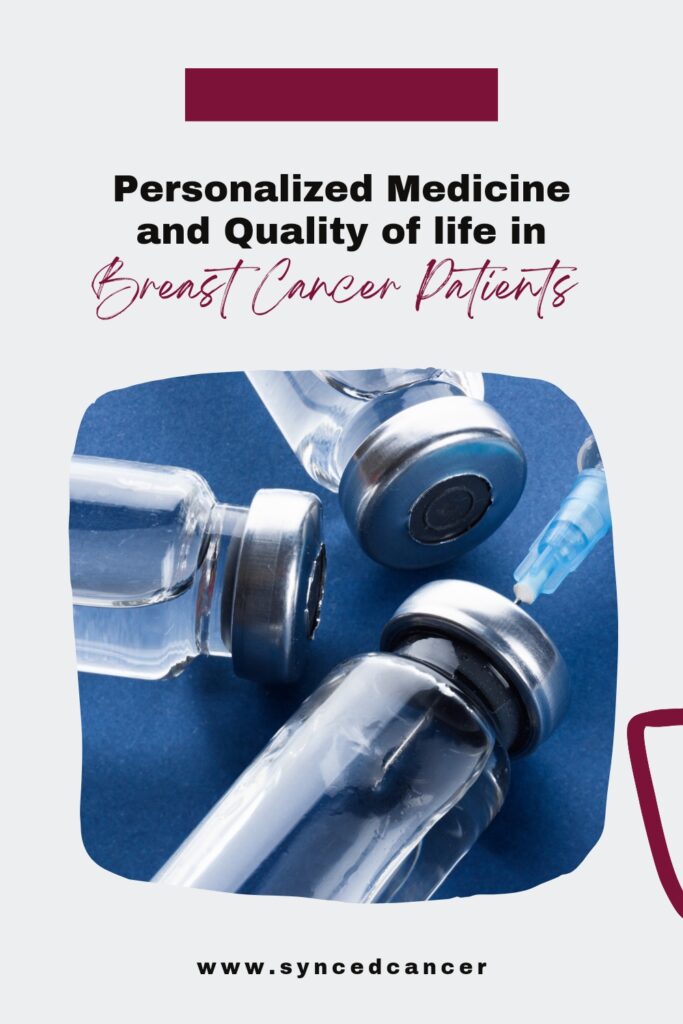Millions of people worldwide suffer from breast cancer, which can be emotionally and physically taxing to manage. Even though traditional treatments like radiation, chemotherapy, and surgery have saved many lives, they frequently have serious side effects that can lower a patient’s quality of life. Personalized medicine, which modifies treatment to each patient’s particular genetic, biological, and personal traits, has become a game-changer in recent years. By emphasizing targeted treatment, personalized medicine seeks to raise breast cancer patients’ overall quality of life in addition to increasing survival rates.
Personalized medicine: what is it?
Personalized medicine, also called precision medicine, describes medical procedures that base treatment decisions on a patient’s particular genetic, molecular, and environmental data. For breast cancer patients, this strategy frequently uses genomic testing on individuals to examine tumor DNA and find certain genetic mutations or biomarkers that accelerate the disease’s spread. By matching patients with specific medicines based on these biomarkers, oncologists can ensure that treatment is both minimally invasive and as effective as possible.
Genomic testing, for example, can determine whether a breast tumor is triple-negative, hormone receptor-positive, or HER2-positive. HER2-positive malignancies react favorably to treatments like trastuzumab (Herceptin) or pertuzumab because they overexpress the HER2 protein, which promotes fast tumor growth. Tamoxifen and aromatase inhibitors are examples of hormone-blocking drugs that can be used to treat hormone receptor-positive tumors, which depend on estrogen or progesterone for growth. Triple-negative breast tumors, on the other hand, do not have these receptors, although they might benefit from other cutting-edge treatments like immunotherapy or PARP inhibitors.
Breast cancer patients now have better results at every stage of their journey because of the paradigm shift from a one-size-fits-all treatment approach to a highly focused strategy brought about by these advancements in personalized medicine.

Life Quality: A Central Concern
While survival rates are often used to measure the success of cancer treatments, quality of life (QoL) is equally important. Physical health, emotional stability, mental health, and the capacity to continue regular activities and relationships are all components of quality of life (QoL) for people with breast cancer. Despite their effectiveness, traditional therapies like chemotherapy can have debilitating side effects like nausea, fatigue, hair loss, and neuropathy. Patients’ capacity to work, take care of their families, and maintain a sense of normalcy is frequently impacted by these symptoms.
Furthermore, receiving a breast cancer diagnosis and going through treatment has a huge emotional toll. QoL can be further lowered by the worry, sadness, and dread of recurrence that many patients suffer. By offering therapies that are more effective, less harmful, and more tailored to the individual requirements of each patient, personalized medicine aims to ease these worries.
How Quality of Life Is Improved by Personalized Medicine
- Less Side Effects with Targeted Treatments: The potential of customized medicine to lessen the adverse effects of cancer treatment is one of its main advantages. Conventional chemotherapy causes a wide range of adverse effects, including immunological suppression, hair loss, and gastrointestinal irritation, since it indiscriminately attacks all rapidly dividing cells, including healthy ones. Targeted medicines, on the other hand, target particular biological pathways implicated in tumor growth.
- Personalized Treatment Plans that Align with Patient Needs: Treatment regimens that are customized to each patient’s distinct genetic and biological profile are made possible by personalized medicine. This lessens the trial-and-error method that is frequently used in cancer treatment. By using genomic testing, physicians can find beneficial medicines early on rather than attempting a variety of therapy to see what works.
- Improved Mental and Emotional Health: Patients feel more in control and hopeful when they know that their treatment is tailored to their particular type of cancer. The helplessness, dread, and anxiety that frequently accompany a cancer diagnosis can be lessened with this emotional support. Additionally, patients can preserve a sense of normalcy because personalized treatment frequently entails fewer intrusive procedures and faster recovery times.
- Focus on Long-Term Survivorship: Personalized medicine takes into account the long-term health and quality of life of breast cancer survivors in addition to the immediate treatment results. Despite their effectiveness, many traditional treatments have the potential to cause long-term problems such additional malignancies, neuropathy, or heart damage. Personalized therapy lowers the risk of these long-term negative effects by employing less harmful and more accurate treatments, enabling survivors to enjoy longer, healthier lives.
Challenges and Limitations
Personalized medicine has a number of challenges in spite of its potential. Accessibility is a major challenge. Many patients cannot afford genetic testing and personalized therapy since they tend to be costly and may not be covered by insurance. Furthermore, not all medical facilities—especially those in rural or low-resource areas—have the means or know-how to do genomic testing.
The complex nature of breast cancer itself presents another difficulty. It can be challenging to develop a focused therapy strategy for cancers that lack detectable genetic alterations. Patients may still have to use conventional methods in certain situations, which could lower their quality of life.
Lastly, targeted medicines may have their own special risks, like skin rashes or immune system problems, which need cautious control, even though personalized therapy lessens many typical side effects.
The Future of Personalized Medicine in Enhancing Quality of Life
The promise of personalized medicine to improve the quality of life for people with breast cancer will only increase as research and technology progress. Researchers are finding new diagnostics and treatment possibilities by more effectively analyzing genetic data through innovations like artificial intelligence and machine learning.
In order to ensure that all patients can take advantage of these developments, efforts are also being made to make it affordable and increase the accessibility of genomic testing. Patient results can be further enhanced by combining supporting care, such as exercise, diet, and mental health services, with specific medicine. For instance, patients may be able to control therapeutic side effects and preserve their general health with the support of personalized lifestyle suggestions based on genetic profiles.
Conclusion
With its emphasis on tailored therapies that increase survival rates while maintaining quality of life, personalized medicine is a paradigm change in the treatment of breast cancer. A more extensive approach to cancer care is provided by personalized medicine, which lowers side effects, creates individualized treatment programs, and attends to emotional and long-term survivability requirements.
Even if there are still obstacles to overcome, continued research and technological developments could make tailored treatment more widely available and efficient for all patients with breast cancer. Personalized medicine is changing the breast cancer experience into one of empowerment, hope, and resilience by placing a higher priority on quality of life in addition to medical outcomes.










What do you think?
It is nice to know your opinion. Leave a comment.